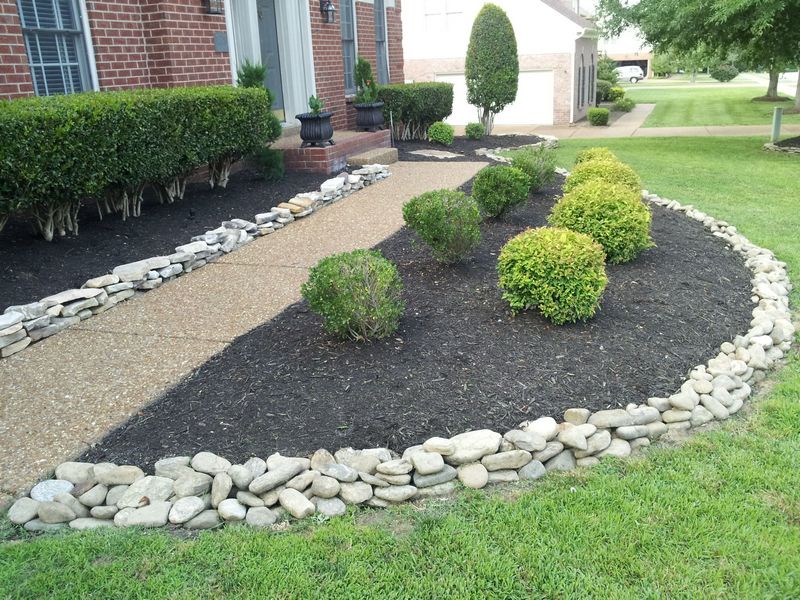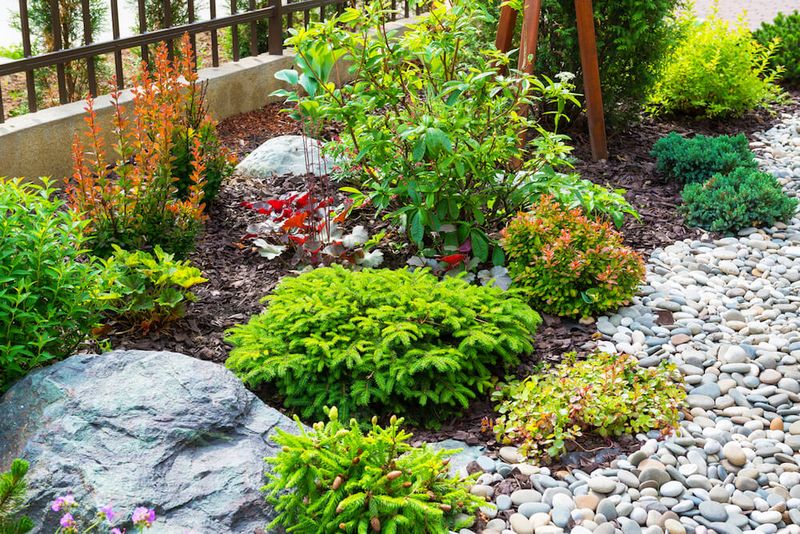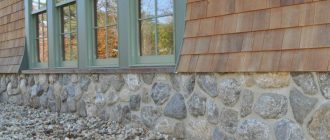
Should I Landscape with Stones or Mulch?
When it comes to landscaping, one of the first questions you may ask yourself is whether you should go with stones or mulch. Both options have their advantages and disadvantages, and understanding them is essential to making the right decision for your landscape.
Stones can provide a sleek and modern look to any outdoor space. They are durable and low maintenance, making them an ideal choice for homeowners who want a long-lasting solution. Stones also offer excellent drainage and can withstand heavy foot traffic. However, they can be more expensive than mulch and may retain heat, making the surrounding area warmer.
Mulch, on the other hand, is a more budget-friendly option. It comes in a variety of colors and can add a natural and organic feel to your landscape. Mulch also acts as a weed barrier and helps to retain soil moisture. However, mulch may need to be replenished regularly, and it can attract pests like termites and ants. Additionally, mulch may float away during heavy rain or windy conditions.
Ultimately, the decision between stones or mulch for your landscape should be based on your personal preferences, budget, and maintenance capabilities. Consider factors such as cost, durability, appearance, and maintenance requirements before making your choice. Remember, both options have their pros and cons, so choose wisely to create a beautiful and functional outdoor space.
What to Consider: Stones or Mulch?
When deciding on the materials to use in your landscape, you should consider the benefits and drawbacks of both stones and mulch. Each option has its own unique characteristics that can enhance the overall look and functionality of your outdoor space.
Stones:
| Low maintenance | Higher initial cost |
| Durable and long-lasting | Can make it difficult to plant or remove plants |
| Helps with weed control | Can become hot in direct sunlight |
| Provides a natural look | May shift over time and require occasional leveling |
Mulch:
| Lower initial cost | Requires regular replenishment |
| Improves soil quality as it breaks down | Can attract pests if not properly maintained |
| Helps retain moisture in the soil | May grow mold or fungus if too thick |
| Easy to plant and remove plants | May blow or wash away in heavy rain |
Both stones and mulch have their own unique advantages and disadvantages. Depending on your specific needs, budget, and personal preferences, you can choose the option that best suits your landscape. Whether you decide to go with stones or mulch, it’s important to properly maintain and care for your chosen material to ensure its longevity and effectiveness in your outdoor space.
Benefits of Stones
When it comes to choosing between mulch and stones for your landscape, there are several benefits to consider when opting for stones:
- Durability: Stones are known for their longevity. Unlike mulch, stones do not decompose or break down over time, making them a durable choice for your landscape.
- Low Maintenance: Stones require minimal maintenance compared to mulch. They do not need to be replaced or refreshed regularly, saving you time and effort in the long run.
- Water Conservation: Stones help conserve water by preventing evaporation from the soil. They create a barrier that reduces the amount of water lost to the atmosphere, keeping your plants hydrated for longer periods.
- Weed Control: Stones act as a natural barrier to weed growth. They provide a layer of protection that prevents weeds from sprouting and competing with your plants for nutrients and sunlight.
- Aesthetics: Stones can add a unique and visually appealing element to your landscape design. They come in various colors, sizes, and textures, allowing you to create a customized look that complements your outdoor space.
- Sustainability: Stones are a sustainable choice for your landscape. Unlike mulch, which requires regular replenishment and potentially contributes to deforestation, stones can be sourced locally and often have a smaller carbon footprint.
Considering these benefits, if you are looking for a low-maintenance and long-lasting solution for your landscape, stones may be the ideal choice for you.
Drawbacks of Stones
While stones may have their advantages for landscaping, there are some drawbacks to consider before choosing them over mulch.
- Cost: Stones are typically more expensive than mulch, especially if you have a large area to cover.
- Installation: Stones can be more challenging to install compared to mulch. They require careful placement and leveling to create an even surface.
- Maintenance: Stones can accumulate debris and leaves over time, which can be difficult to remove. They may also require periodic repositioning to prevent erosion.
- Drainage: Stones can hinder water absorption, leading to poor drainage in your landscape. This can result in water pooling or runoff issues.
- Heat Retention: Stones tend to absorb and retain heat, which can create a hotter environment for plants and potentially damage their roots.
- Less Nitrogen: Unlike mulch, stones do not break down over time, depriving your plants of important nitrogen-rich organic matter.
- Aesthetics: The look of stones may not be to everyone’s taste. Depending on your personal preference and the style of your landscape, mulch may be a more visually appealing option.
Considering these drawbacks, it’s important to weigh the pros and cons before deciding whether to use stones or mulch in your landscape.
Benefits of Mulch
Mulch is an excellent choice for your landscape, with a variety of benefits that make it a popular option for many homeowners.
- One of the main benefits of mulch is its ability to conserve moisture in the soil. The mulch acts as a protective layer, helping to retain water and reduce evaporation, keeping your plants hydrated and healthy.
- Mulch also helps to control weeds by preventing their growth. The layer of mulch acts as a barrier, preventing sunlight from reaching weed seeds and inhibiting their germination. This reduces the need for manual weeding and helps to keep your landscape neat and tidy.
- Another advantage of using mulch is its insulating properties. Mulch helps to regulate soil temperature, keeping it cooler in the summer and warmer in the winter. This can help to protect plant roots from extreme temperatures and reduce stress on your plants.
- In addition, mulch can improve soil health by gradually breaking down and adding organic matter to the soil. This enriches the soil, improves its structure, and provides a nutrient-rich environment for plant growth.
- Furthermore, mulch can enhance the aesthetic appeal of your landscape. It comes in a variety of colors and textures, allowing you to choose the option that complements your plants and overall design.
Overall, mulch is a versatile and beneficial choice for your landscape, offering advantages such as moisture conservation, weed control, insulation, soil improvement, and visual appeal.
Drawbacks of Mulch
While mulch has its benefits for a landscape, there are also drawbacks that should be considered. One disadvantage of using mulch is that it can attract pests, such as insects and rodents, towards your plants. The organic material of the mulch can provide a food source for these pests, creating a potential problem for your garden.
Another drawback of using mulch is that it requires regular maintenance. Over time, mulch can break down and decompose, losing its effectiveness as a weed barrier. It may need to be replaced or topped up regularly to ensure it continues to provide the desired benefits.
In addition, the use of mulch can create a favorable environment for fungi and mold to grow. This can lead to various plant diseases and rotting of the roots. Proper care and monitoring are necessary to prevent these issues.
Finally, the appearance of mulch may not be to everyone’s liking. Some people prefer the natural look of stones or gravel in their landscape, as opposed to the organic appearance of mulch.
| Helps retain moisture in soil | Attracts pests |
| Drainage | Stones allow for excellent drainage, which can prevent water from pooling and promote healthy plant growth. | Mulch also allows for good drainage, but it may retain moisture for longer periods of time, leading to potential waterlogging. |
| Weed Control | Stones provide a barrier against weeds, making it harder for them to grow in your landscape. | Mulch acts as a natural weed suppressor, limiting weed growth and making it easier to maintain your garden. |
| Erosion | Stones can be more prone to erosion, especially in heavy rain or windy conditions. | Mulch helps to prevent soil erosion by acting as a protective layer, providing stability to your landscape. |
| Sustainability | Stones are a non-renewable resource, as they need to be mined and transported, contributing to carbon emissions. | Mulch, on the other hand, can be made from recycled materials or renewable sources, making it a more sustainable option. |
| Aesthetics | Stones can give your landscape a more polished and modern look. | Mulch provides a natural and organic appearance to your garden. |
In conclusion, the choice between stones and mulch for your landscape depends on your specific needs and preferences. While stones offer better drainage and weed control, mulch helps with erosion control and sustainability. Consider these factors before making a decision, and choose the option that aligns with your environmental values.
Choosing Stones for Your Landscape
When deciding on the right material for your landscape, stones can be a great option to consider. Whether you want to create a modern and sleek look or a rustic and natural feel, stones can help you achieve the desired effect.
One of the main advantages of using stones in your landscape is their durability. Unlike mulch, which can decompose over time, stones can last for many years without needing to be replaced. This makes them a low-maintenance option for the long run.
Stones also offer a wide range of design possibilities. They come in various colors, shapes, and sizes, allowing you to create a unique and personalized look for your outdoor space. Additionally, stones can be arranged in different patterns or used to create borders and pathways, adding visual interest and functionality to your landscape.
Another benefit of using stones is their ability to retain moisture. They can help to prevent soil erosion and keep the ground underneath them cool and moist. This can be particularly beneficial for plants and flowers in your landscape, as it creates a more favorable environment for growth.
On the other hand, it is important to consider some drawbacks when choosing stones for your landscape. They can be more costly upfront compared to mulch, especially if you opt for high-quality or specialty stones. Stones also tend to absorb heat, which can make your outdoor space hotter during summer months.
In conclusion, stones offer a durable and versatile option for your landscape design. They can provide a unique and attractive look to your outdoor space, while also offering practical benefits such as moisture retention. However, it is important to consider your budget and climate conditions before deciding on stones or mulch for your landscape.
Choosing Mulch for Your Landscape
When it comes to deciding between stones or mulch for your landscape, there are several factors to consider. Mulch has its own advantages that might make it the preferred choice for your landscaping needs.
- Appearance: Mulch can provide a more natural and organic look to your landscape. It comes in various colors and textures, allowing you to choose the one that complements your overall design.
- Cost: Mulch tends to be more cost-effective compared to stones, especially if you have a large area to cover. It is readily available and can be easily replenished as needed.
- Plant Health: Mulch can improve the health of your plants by retaining moisture, reducing weed growth, and providing insulation from extreme temperatures. It also breaks down over time, enriching the soil with organic matter.
- Installation: Mulch is relatively easy to install. It can be spread evenly over the designated area using a rake or shovel. Additionally, mulch can be easily moved or altered if you decide to change the design of your landscape in the future.
- Maintenance: Mulch requires regular maintenance to prevent weed growth and ensure proper moisture retention. It may need to be replenished periodically as it breaks down. However, this maintenance is typically less labor-intensive compared to stones.
Considering these factors, it is worth assessing the specific needs of your landscape before making a decision between stones or mulch. If you prioritize a natural appearance, cost-effectiveness, plant health, easy installation, and relatively low maintenance, mulch may be the ideal choice for your landscape.
Q&A:
What are the benefits of using stones in my landscape?
Using stones in your landscape can provide several benefits. One main advantage is that stones are durable and can last for a long time without needing to be replaced. They also provide good drainage, which can be helpful in preventing waterlogged soil. Additionally, stones can give your landscape a more polished and structured look.
Are there any downsides to using stones in my landscape?
While stones have their benefits, there are also some downsides to consider. One disadvantage is that they can be difficult to install and require more labor than other options. Stones can also become very hot in the sun, which can be uncomfortable to walk on. Another consideration is that stones can be more expensive compared to other materials.
What are the advantages of using mulch in my landscape?
Mulch provides several advantages for your landscape. It helps retain moisture in the soil, reducing the need for frequent watering. Mulch also suppresses weed growth and helps moderate soil temperature. Additionally, mulch can improve the appearance of flower beds and add a natural, organic look to your landscape.
Are there any drawbacks to using mulch in my landscape?
While mulch has its benefits, there are also some drawbacks to consider. One disadvantage is that mulch needs to be replaced regularly, as it decomposes over time. Mulch can also attract pests such as termites or ants. Another consideration is that certain types of mulch, such as wood chips, may require regular maintenance, such as periodic turning or raking, to prevent compaction.
Can I use both stones and mulch in my landscape?
Yes, you can use both stones and mulch in your landscape to create an interesting and diverse look. For example, you can use stones as a pathway or border, and then use mulch in flower beds or around trees. The combination of stones and mulch can provide different textures and colors, adding visual interest to your landscape.
What are some of the pros of using stones for landscaping?
There are several pros of using stones for landscaping. First, stones are a durable option that can withstand harsh weather conditions and heavy foot traffic. Second, stones provide excellent drainage, preventing water from accumulating around plants and causing root rot. Third, stones do not decompose or require regular replacement, making them a low-maintenance choice for landscaping. Lastly, stones can create a visually appealing and natural-looking landscape design.
Are there any drawbacks to using mulch for landscaping?
While mulch has its benefits, there are also a few drawbacks to consider. First, mulch decomposes over time and needs to be replenished regularly. This can be a time-consuming and costly task. Second, mulch can attract pests, such as termites or ants, which may become a nuisance. Third, mulch can also retain water, which can be detrimental to certain plants if not properly managed. Lastly, mulch can fade in color over time and lose its aesthetic appeal.







